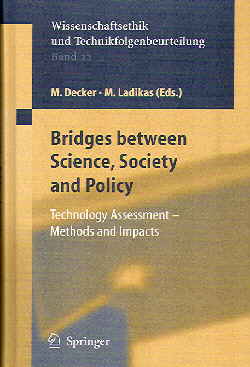M. Decker, M. Ladikas (Eds.)
Bridges between Science, Society and Policy.
Technology Assessment - Methods and Impacts
Berlin Heidelberg New York: Springer 2004, (Reihe "Wissenschaftsethik und Technikfolgenbeurteilung", Bd. 22), ISBN 3-540-21283-3,
250 Seiten, 53,45 Euro
[Foreword/htm]
[Contents/htm]
Preface
 Today, technological impact assessment is more necessary than ever before. Technological leaps are now no longer measured in centuries, but in decades. Assessing such developments is becoming ever more complicated and, for political authorities, ever more difficult. There is no doubt that science and technology have become more intrusive and more a part of our daily lives and no-one is unaware of the power that
discoveries in science have to radically alter our lives and our
relationship with our environment. Information technology, biotechnology
and genetic engineering are cases in point; but technological developments in agriculture, the energy sector and transport, for example, are also becoming increasingly complex.
Today, technological impact assessment is more necessary than ever before. Technological leaps are now no longer measured in centuries, but in decades. Assessing such developments is becoming ever more complicated and, for political authorities, ever more difficult. There is no doubt that science and technology have become more intrusive and more a part of our daily lives and no-one is unaware of the power that
discoveries in science have to radically alter our lives and our
relationship with our environment. Information technology, biotechnology
and genetic engineering are cases in point; but technological developments in agriculture, the energy sector and transport, for example, are also becoming increasingly complex.
Politicians are called upon increasingly to make decisions on matters of considerable technological complexity, and more and more on matters which involve very difficult ethical and environmental considerations. When the political community takes a decision to accept and encourage a technology, this is often not a decision which can be reversed at short notice. If Members of Parliament are to be able to take decisions on these matters in a fully informed and meaningful way, they need access
not only to information, but to information which is presented in
a way that can be understood by the non-expert and in a way which allows the consideration of various political options in the light of the
possible consequences of those options.
Technological impact assessment requires long-term comprehensive investigation, which cannot be carried out either by a documentation centre or by research support units of a parliament. Technology Assessment performs a different role in a parliamentary context than
do the standard parliamentary research services – many parliaments
in Europe and elsewhere recognise this by having a separate Technological
Impact Assessment Unit of some kind. Many people, including politicians, do not understand this difference in role and it is part of our duty to
make the difference clear between the simple provision of information –
which is certainly not a role to be denigrated or downgraded –
and the assessment of scientific and technological advances, which goes a step further.
As the power of science transforms our lives in ways which humanity never
before imagined, we the politicians together with the scientists carry increasingly heavy responsibility for guiding and illuminating the way in which our society develops and grows. The objective of TAMI to create and promote a structured dialogue, an interaction and information sharing within the Technology Assessment community on a more international level, is the only possible way to meet the future
needs. I salute the successful completion of the project and I look forward to disseminating these results in the policymaking community of Europe. TAMI has been another step in the improvement of policy advice and therefore, better science policy in Europe.
|
Brussels, November 2003
|
Gerhard Schmid, Vice-President European Parliament
|
Created: 20.09.2004 -
Comments to:
info@itas.kit.edu
 Today, technological impact assessment is more necessary than ever before. Technological leaps are now no longer measured in centuries, but in decades. Assessing such developments is becoming ever more complicated and, for political authorities, ever more difficult. There is no doubt that science and technology have become more intrusive and more a part of our daily lives and no-one is unaware of the power that
discoveries in science have to radically alter our lives and our
relationship with our environment. Information technology, biotechnology
and genetic engineering are cases in point; but technological developments in agriculture, the energy sector and transport, for example, are also becoming increasingly complex.
Today, technological impact assessment is more necessary than ever before. Technological leaps are now no longer measured in centuries, but in decades. Assessing such developments is becoming ever more complicated and, for political authorities, ever more difficult. There is no doubt that science and technology have become more intrusive and more a part of our daily lives and no-one is unaware of the power that
discoveries in science have to radically alter our lives and our
relationship with our environment. Information technology, biotechnology
and genetic engineering are cases in point; but technological developments in agriculture, the energy sector and transport, for example, are also becoming increasingly complex.